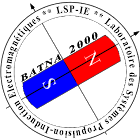, “New MRAS Approach for Sensorless control of IM,” 19th International Conference on Sciences and Techniques of Automatic Control and Computer Engineering (STA). pp. 36-40, 2019.Abstract
Communication Internationale
, “Modified Robust Model Reference Adaptive System Scheme for a Speed Sensorless Vector Control of Induction Motor,” 19th International Conference on Sciences and Techniques of Automatic Control and Computer Engineering (STA). pp. 473-478, 2019.Abstract
, “New Synergetic Control for an Induction Motor with a synergetic Speed and Rotor Flux Estimation,” ICCEE’18 International conference on communications and electrical engineering. 2018.
, “Robust Dynamic surface control of interior Permanent Magnet Synchronous Motors,” international conference on Electronics, Energy and measurement (IC2EM). 2018.
, “Robust Backstepping control with integral action of IPM Synchronous Motor,” The Third international conference on Electrical sciences and technologies in Maghreb (CISTEM). 2018.
, “dSPACE Validation of Improved Backstepping Optimal Energy Control for Photovoltaic Systems,” 6th International Renewable and Sustainable Energy Conference (IRSEC). pp. 1-6, 2018.Abstract
, “Implementation of finite set model predictive current control for shunt active filter,” 9th International in Renewable Energy Congress (IREC), . 2018.Abstract
, “Implementation of power management based on fuzzy logic for a hybrid PV/Fuel Cell generation system,” International Conference On Emerging and Renewable Energy : Generation and Automation, Sousse-Tunisia. pp. 1-6, 2018.Abstract
, “Optimal Coordination Time Interval for DOCRs in Presence of D-FACTS,” IEEE 5th International Congress on Information Science and Technology (CiSt), Marrakech, Morocco. pp. 477-480, 2018.Abstract
, “Direct Power Control of DFIG by Sliding Mode Control and Space Vector Modulation,” 7th International Conference on Systems and Control (ICSC), Valencia, Spain. pp. 462-467, 2018.Abstract
, “An advanced energy management system with an economical optimization for a multi-sources stand-alone Home,” 7th International Conference on Systems and Control (ICSC), Valencia, Spain. pp. 154-159, 2018.Abstract
, “Control and optimal management of a multi-source energy system,” 7th International Conference on Systems and Control (ICSC), Valencia, Spain. pp. 164-168, 2018.Abstract
, “dSPACE Real-Time Implementation Sliding Mode Maximum Power Point Tracker for Photovoltaic system,” 7th International Conference on Systems and Control (ICSC), Valencia, Spain. pp. 137-141, 2018.Abstract
, “The dynamic control and optimal management of the energy in the case of a territory isolated in Batna city,” 7th International Conference on Systems and Control (ICSC), Valencia, Spain. pp. 160-163, 2018.Abstract
, “Experimental control of a Doubly Fed Induction Generator based Wind Energy Conversion System,” 2018 7th International Conference on Systems and Control (ICSC), Valencia, Spain. pp. 142-147, 2018.Abstract
